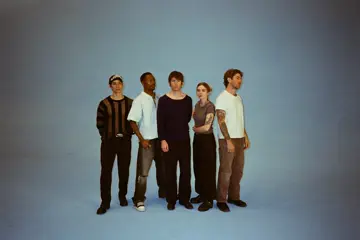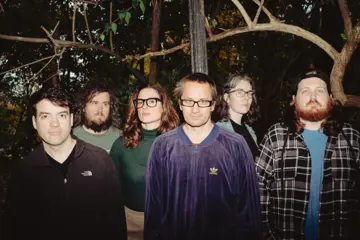There are some artists who just do not fit within a genre. From what can only be defined as themselves, the consistency of their signature sound only grows fonder with longevity. Yet, even then still, these standouts can find themselves within communal loopholes, where they are met and comforted by the company of loosely like-minded musicians. The utmost, ultimate impressive songwriters and composers are those that stay afloat in isolation; the ones that absolutely sound like none other, and can be identified purely by only hearing a bar of their music. Those geniuses like, TYCHO.
Releasing his first EP, The Science of Patterns independently back in 2002, Scott Hansen - the brains behind Tycho, has since built himself a sonic empire, releasing full length albums, signing to Ghostly International, and creating signature motifs both in his sound and through his gorgeous photography and graphic designs under the pseudonym, ISO50. Mixing hues to fill ornate shapes and crisp symmetry, the visual elements marry up with the sonic narratives perfectly, and have carried into Tycho's live show to create a memorable, multi-sensory experience.
A show we'll soon be reunited with, Tycho returns to our shores early 2017, as part of the Australian Laneway Festival. Ecstatic to catch his new show, it'll be the first time we'll hear Epoch live - the final chapter of his album trilogy that dropped as a surprise release in September, 2016. The combining agent to previous records, Dive (2011) and Awake (2014), Epoch ties up any loose threads to unify this three-part journey.
A visionary in his own craft and proceedings, we gained deep insight into the ethos and practice of Tycho, as we were extremely fortunate to chat with Scott Hansen.
You’re a visual artist and a musician. What is it about the creative realm that is so important to you?
Don't miss a beat with our FREE daily newsletter
It’s always been a huge way that I’ve found to express myself, through those two mediums. It’s just a way to get out some of the stuff that I’m not able to articulate in any other way.
Before your first record, Past Is Prologue, you released the Science of Patterns EP. What was Tycho to you at that point in time?
I just saw it as a hobby, 'cause I never spent a lot more time on it than any other normal hobby. It definitely wasn’t my job or my career, I was just really, really passionate about it, and felt compelled to do it. That was the first time I got serious and decided to make an official release, so for me that was just exciting to have a CD, or to have anybody other than my friends or family hear the music.
Reflecting on that EP title, I feel like it describes your composition; how it’s all pieced together. Was that the reason behind the name?
Well that’s the definition of mathematics – the science of patterns. For me, I was just studying a lot of mathematics and physics at that time in college. I saw a big connection between music and maths, and I was also listening to a lot of Boards Of Canada, and noticed how their music related to mathematics; I guess I just saw a big overlap between the patterns and the sounds in music and the stuff I was studying.
You released Epoch a couple of weeks ago. Why did you decide to push this one out on its own?
I’d been working on it for like a year, and it was pretty delayed, by about three months; it took longer than I thought it was going to take. I started thinking about what a normal release cycle is like, and it just started to occur to me, “Why do we need to have this whole build up?” Other than having the physical stuff ready on the first day of course, that would have been nice to have the vinyl.
Mainly for me it’s just about connecting more directly to the people who are going to be listening to it, and having it be this moment where this music that is new to me, is also new to these other people, so we’re experiencing it at the same time; as opposed to, you know, handing the music in to the label and sitting on it for four months while they get everything ready. When it comes out, by that time people are hearing it and it’s new to them, but it’s not new to me? So I wanted to be a part of the experience and to have everyone be at the same place.
Epoch is the final chapter of your album trilogy. What message are you hoping to convey with this LP?
I think the overall goal was to set in a wave circle back to some of the concepts from earlier in the project, and really explore them to their logical end. As well as actually building on new techniques, skills and resources that I have at my disposal at this stage in my career, that I might not have had back then, and really take them and apply them to those older concepts.
At the same time, taking all of that and showing how it could be re-contextualised or seen through a different lens, and basically just pushing all of that stuff into the future and maybe allowing a view into what the future holds for the project.
We experience harder tones and heavier beats in Epoch. Were these harsher themes something you’d been wanting to explore for some time?
It’s just sort of a logical progression. I’ve been trending towards more live instrumentation - I mean I listen to almost all rock, and it’s a little bit more aggressive than the stuff that I make, so over the years that’s always been finding its way more and more into my music. For me, I guess I’ve just explored a lot of softer, warmer spaces in the past. I wanted to do something a little bit more stripped down, sleek and aggressive, and just see where that went. That was what this was about.
As a listener, I feel the record itself experiences a point of vulnerability, then awakening and maturity. Was it written to be listened to from cover to cover?
Yeah, I’m a big believer in the album experience. Music is great on its own, song by song, but I think there’s a different type of experience to be had when you listen to a record front to back, the way that the artist intended it, as long as they’ve built in some meaning to that, a sort of narrative.
So yeah, there was a lot of thought that went into the track order, and the emotional energy spaces that kind of flow throughout the record. I’m hoping that people will take it in that way, at least the first few listens.
Epoch was released without marketing interference, and you took to Reddit to directly chat with fans. Would I be right in saying that you’re more about connection rather than making a big fuss when delivering your music?
Yeah, this project has always been a grass roots kind of thing. It’s not like we’re making pop music or anything that’s ever really going to explode on some mainstream stage. For us, it’s always been about our fanbase and the people who support us. I feel like we’ve always had a really close connection, and have always communicated well, so I wanted this album to be no different to any of the other ones and definitely maintain that connection with the fans; because that’s basically what we are. All we are is where our fans support us doing stuff, so that’s an important part for us.
Tycho has a signature atmospheric, transcendent sound. You’ve maintained this, despite the potential impact of passing trends over the years. Are trends something you tend to steer clear of?
I’ve seen a million trends come and go since 1995, or whenever it was that I really started to pay attention to electronic music. I love it all, and I think a small part finds its way in, one way or the other, no matter how broad or generalised any of it is, but I’m never looking to be a part of any specific scene, or trend or movement. I’m just doing what comes naturally, and whatever that is ends up being Tycho records.
In saying that then, would you say you’re inspired just by everyday life? How do you come to write your music?
Yeah, but it’s not like I see a mountain [laughs] and write a song about that mountain. It’s more like a vague, emotional space. I love sitting down and writing music, and at any chance I get, I do that. You just let it flow through you. Some days it’s lame and boring [laughs], some days it’s interesting. So when it’s interesting I take that, put it aside and say, “That’s something I want to work on,” and go about spending the next 200 hours or whatever on it, you know?
Every song as an idea is this really raw thing, but then the album is more like a crafted thing, so by the end, an album is just the result of hours and hours spent refining and changing and tweaking things.
You’ll be performing at Laneway Festival early 2017. Can we expect any ISO50 work for an audio / visual experience?
Yeah! I’ve created video visuals for all of the songs, so we always show those, and they sync up with the show. The idea behind the show is supposed to be a cinematic, audio / visual experience that blurs the line between the performance and what you see on the screen, so that’s always a big part of the show.
Do your live sets hold a lot of improvisation, or do you play songs as they are recorded?
We typically try to stay true to the album version on the newer stuff, but on the older stuff we branch out a little bit more, but there’s always room for improvisation and moving around a little bit. We try to leave that in to make it fun and interesting. So it’s song to song, but there’s definitely a lot of improvisation in there.
How far back in the catalogue do you go for your live show?
Right now, we’re rebuilding the whole live set, so we’re actually going to start digging back a little bit further than we have been lately. I think the oldest stuff is Past Is Prologue, but I’d really like to maybe work in some of the earlier stuff from Science Of Patterns on the next go around, but for now we’re just playing songs from, Past Is Prologue.
What’s next for Tycho?
We’re definitely focused on touring and the live show right now, but I’ve got a couple of things on the backburner that I’ll be bringing to the forefront now that the album is done, and get started on new stuff.
Do you think you’ll ever do another trilogy type release again?
Ah you know, that remains to be seen, that was kind of just defining it as an era where I was going for this sound and going for this concept, and trying to take it as far as I could, and seeing where it felt like, “Okay that’s the end; I feel like I’ve satisfied my desire to pursue this thing.”
So I think the future is probably just going to be branching off into other directions, and if it’s one of those directions where it’ll last three albums long, that’d be awesome [laughs], that’d be a trilogy, but right now I’m just focused on the next record.
Tycho's fourth studio album, Epoch is available in Australia now via Inertia. Catch Tycho perform at St. Jeromes Laneway Festival in your city over February, 2017.
Words by Hannah Galvin.
SEE ALSO:
INTERVIEW: TYCHO "AUSTRALIA FEELS SO FAMILIAR YET SO FOREIGN..."















